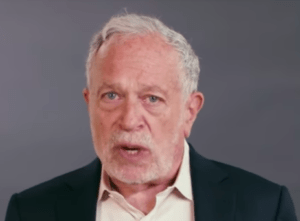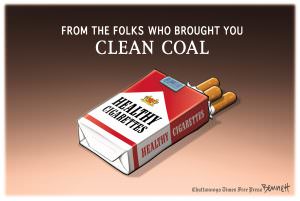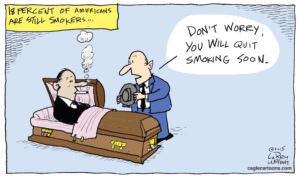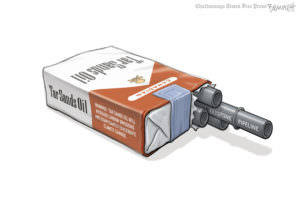Regulating Cigarettes, at Last
Congress is known for leaving business unfinished, but rarely is a task left undone for more than four decades.Congress is known for leaving business unfinished, but rarely is a task left undone for more than four decades.
The tobacco industry is a prolific donor of campaign funds and a lobbying titan. So the federal government has left it mostly alone since the 1964 surgeon general’s report declared that cigarette smoking causes disease and death.
“This is the only consumer product that, when used as intended, kills people,” says Matthew Myers, president of the Campaign for Tobacco-Free Kids. “And it is unregulated.”
Until, one can hope, right now.
Before departing for its August break, the House of Representatives passed the first-ever comprehensive tobacco regulation bill. It gives the Food and Drug Administration the authority to regulate tobacco by, among other things, cracking down on marketing to children, mandating dramatically stronger health warnings on every pack, and requiring that the warnings be larger than they are now. Most significantly, the government would ban use of words such as light and mild that are meant to fool smokers into thinking there is such a thing as a safe, or safer, cigarette. It would prohibit sweet flavorings now used to make smoking seem palatable, though it wouldn’t go far enough in reducing the use of menthol flavors, favored among African-American smokers.
And for the first time, tobacco companies would have to disclose to the government just what is in cigarettes. Right now, Myers says, there are more than 60 known cancer-causing agents in cigarettes, but most information on them is held privately by the industry. “The FDA doesn’t even know what is in there,” he says. The legislation, Myers believes, “takes the decisions about what might be in cigarettes away from the tobacco industry … and turns them over to the scientists.”
The politics of this belated action are notable and, it must be said, should give pause to any American who thinks that Congress, or “Washington,” can never, ever achieve anything of genuine significance.
Finally, a bipartisan — and veto-proof — majority of House members voted to support public health rather than suck up to Big Tobacco. In the Senate, supporters of the measure believe they have enough votes to survive a veto and perhaps even a threatened filibuster. Both presidential contenders are co-sponsors of the Senate bill.
Which leaves the Bush administration isolated. The White House has said that if the legislation reaches the desk of President Bush, his advisers would recommend a veto.
The reasoning is positively Orwellian. “FDA regulates drugs and devices by approving products after weighing the benefits against the risks of a product,” the White House policy statement on the bill says. “In contrast, there is no such thing as a cigarette in which the benefits outweigh the risks. The use of tobacco products is inherently unsafe.”
Taken to its logical conclusion, this would mean that the government should ban cigarettes, not stop at merely regulating them. The only other translation possible is that the White House has concluded cigarettes are so dangerous the government should do nothing about them.
You might recognize this as the sort of doublespeak the industry itself mastered long ago. Cigarettes are an adult pleasure, it insists — while systematically marketing them in ways that appeal to adolescents, the group most likely to take up smoking and become hooked. Cigarette smoking is a choice, not an addiction. Yeah, right. Most Americans stopped believing this nonsense years ago. Now it seems that Congress has finally caught up with public sentiment.
Besides Bush, the one obstacle to enactment of this necessary measure is time. In this election year, the Senate has few days left to work before leaving town once again to campaign. The rules of the chamber not only allow for a filibuster but also for linkage to a much more controversial bill — offshore oil drilling, anyone? So a handful of opponents could still impede action. These are the kinds of smokescreens that have been used to shield tobacco in the past: The first effort at legislation along these lines was introduced more than two decades ago.
With 400,000 deaths each year and more than four decades after we were told this would be tobacco’s effect, it is awfully hard to see how congressional delay and political denial should still carry the day.
Marie Cocco’s e-mail address is mariecocco(at)washpost.com.
© 2008, Washington Post Writers Group
Your support matters…Independent journalism is under threat and overshadowed by heavily funded mainstream media.
You can help level the playing field. Become a member.
Your tax-deductible contribution keeps us digging beneath the headlines to give you thought-provoking, investigative reporting and analysis that unearths what's really happening- without compromise.
Give today to support our courageous, independent journalists.





You need to be a supporter to comment.
There are currently no responses to this article.
Be the first to respond.